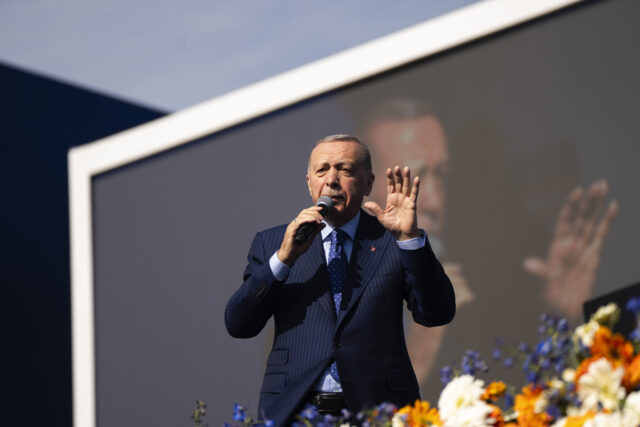ANKARA: Turkish voters will head to polling booths on Sunday to elect representatives to local bodies, which will gauge the popularity of President Recep Tayyip Erdogan as his ruling party tries to win back key cities it lost five years ago. A victory for Erdogan’s party might encourage him into pursue constitutional changes that could allow him to rule beyond his current term’s limit. If his party doesn’t win, it will give a boost to Turkey’s opposition, which was left fractured after a defeat in last year’s presidential election. So what’s at stake and what could the results hold for Turkey’s future.
The Battle For Istanbul
In the last local body elections held in 2019, a united opposition won the municipalities of capital Ankara and the commercial hub of Istanbul, ending the ruling party’s 25-year hold over the cities.
The loss of Istanbul was a major blow to Erdogan, who began his political career as mayor of the metropolis, which has a population of nearly 16 million, in 1994.
Erdogan has named Murat Kurum, a 47-year-old former minister, to run against incumbent mayor, Ekrem Imamoglu—a popular politician from the center-left Republican People’s Party, or CHP. Imamoglu has been touted as a possible presidential candidate to challenge Erdogan.
This time around, however, Imamoglu, 52, is running in the local elections without the support of Turkey’s main pro-Kurdish party or the nationalist IYI Party who are fielding their own candidates.
Meanwhile, a new religious-conservative party, the New Welfare Party, or YRP, has also thrown its hat into the ring. Appealing to conservative and religious voters who have been disillusioned with Erdogan’s handling of the economy, it is expected to steal some votes from Erdogan’s candidates.
Opinion polls point to a neck-and-neck race between Imamoglu and Kurum who have both promised infrastructure projects to render buildings earthquake-proof and to ease the city’s chronic traffic congestion.
The opposition is widely expected to maintain its hold on Ankara where the incumbent mayor Mansur Yavas, who has also been named as a future presidential candidate, remains popular.
Erdogan Seeks To Consolidate Power
Erdogan, who has been in power as prime minister and then as president for more than two decades, has been holding election rallies across the country, campaigning on behalf of candidates running for mayor.
Analysts say winning back Istanbul and Ankara and achieving a strong showing in the ballots would strengthen Erdogan’s resolve to introduce a new constitution that could allow him to rule beyond 2028 when his current term ends. The current constitution sets a two-term limit on the presidency.
Erdogan, 70, ran for a third term last year, citing a technicality, because the country switched to a presidential system in 2018 and his first term was held under the previous system.
Erdogan and his allies don’t currently have sufficient seats in parliament to enact a new constitution but another electoral triumph may sway some conservative opposition parliamentarians to switch sides, analysts say. Earlier this month, Erdogan said Sunday’s election would be his last according to the constitution. Critics see his comments as a ploy to win sympathy votes of supporters reeling from a cost-of-living crisis, as well as a strategy to push for the constitutional amendments.
Unfair Campaign
As in previous elections, Erdogan has been using advantages of being in office, often availing himself of state resources while campaigning. Nearly 90% of Turkey’s media is in the hands of the government or its supporters, according to media watchdog groups.
State broadcaster TRT devoted 32 hours of airtime to the ruling party in the first 40 days of campaigning compared with 25 minutes devoted to the challengers, the opposition alleges.
During campaigning, Erdogan has issued veiled warnings to voters to support ruling party-backed candidates if they want to receive governmental services. He increased the minimum wage by 49% to bring some relief to households, despite his government’s efforts to control high inflation.
The Kurdish Vote
Kurdish voters make up an estimated 10% of the electorate in Istanbul and the way they cast their vote could be decisive. Turkey’s pro-Kurdish party — now known as the Peoples’ Equality and Democracy Party, or DEM — opted to support Imamoglu in the 2019 municipal elections, helping him win. This time, however, the party is fielding its own candidates. Observers say the party deliberately named two low-profile candidates in tacit support of the current mayor.
With inputs from AP
At six feet and over, cool, calm and always collected. Never a hair out of place. He is the high priest of editorial facts, grammar is his baby and headlines are meat on the bone. Loves samosas and cricket, tracks Twitter and when in his cups, nothing better than Jagjit Singh’s ghazals.





